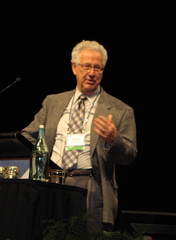 Stephen Turnovsky is an outstanding academic economist. His academic career spans over 40 years, with a distinguished publication record which has kept him in the very top echelon of the profession’s academic journal publishers over a particularly long time period.
Stephen Turnovsky is an outstanding academic economist. His academic career spans over 40 years, with a distinguished publication record which has kept him in the very top echelon of the profession’s academic journal publishers over a particularly long time period.
Early foundations for Stephen’s academic career were laid with a BA in Mathematics and Economics and an MA with 1st class honours in Mathematics from Victoria University of Wellington (VUW). These degrees were conferred in 1962 and 1963 respectively, and during that period he also held positions of part-time research assistant at NZIER and the Applied Mathematics Laboratory of DSIR, and as a Junior Lecturer in Mathematics at VUW. As a signal towards the now over 236 journal publications to come, he quickly had a joint publication in 1964 in the NZ Journal of Geology and Geophysics on the statistics of New Zealand earthquakes, and an econometric case-study of Disequilibrium in the NZ Automobile Market in the June 1966 issue of the Economic Record. The latter study was completed early in Stephen’s time at Harvard University.
Stephen’s PhD from Harvard was conferred in 1968, and led to positions at the Universities of Pennsylvania and Toronto. He was Professor of Economics at the ANU from 1972 to 1982, including as Chairman of the Department of Economics for 3 ½ years, and was then IBE Distinguished Professor of Economics at the University of Illinois from 1982 to 1988. He has been Castor Professor of Economics at The University of Washington in Seattle since 1993, following his appointment in 1988 as Professor of Economics at that University. Since 2010, he has also been Adjunct Professor of Economics at VUW.
Stephen’s publications through to the early 1970s included three important contributions to the then emerging empirical evidence on price and wage expectations, published in the Journal of the American Statistical Association, Economica, and the Review of Economics and Statistics. However, the distinctive features of Stephen’s on-going research became the use of mathematical tools and economic concepts to model problems in the areas of economic growth and dynamics, including applications to optimal macroeconomic policies. Moreover, as befits his having lived and worked for lengthy periods in Australasia and Canada, a great deal of his modelling has been of (small) open economies. The diverseness of Stephen’s publications is reflected not only in the range of core macroeconomic areas addressed and quantitative tools utilised, but also through the number of coauthors with whom he has published – for example, from his September 2011 CVi, I counted an extraordinary number of 77 different journal co-authors and 8 book-related co-authors, for the period since 1969.
Of his 13 books solely or jointly authored or co-edited, there are academics throughout the world who can attest to finding his 1977 Macroeconomic Analysis and Stabilisation Policy, and his 1995 and 2000 editions of Methods of Macroeconomic Dynamics particularly valuable for their graduate macro courses. I’m not going to single out particular articles or journals from Stephen’s CV – suffice to say that by the late 1970s, he had cracked every top-ranked economics journal at least once, with many acceptances since then in these and the best of more recently established journals.
However, recognition for outstanding achievement does not always follow from publications alone, and in this respect it is important to detail the considerable wider recognition of Stephen’s professional achievements.
His Professional Honours include Fellow of the Academy of Social Sciences in Australia (elected 1976), Fellow of the Econometric Society (1981), President of the Society of Economic Dynamics and Control (1982-84), and President of the Society of Computational Economics (2004-06).
He has held visiting positions of distinction over many years, including at the University of California-Berkeley, Nuffield College (Oxford), Academia Sinica (Taipei), IAS Wuhan University, IAS Vienna, CESifo (University of Munich); and has been awarded Doctorat, Honorary Causa by the University of Aix-Marseille II (2005) and an Hon DLitt by Victoria University of Wellington (2009).
The unusual breadth and depth of Stephen’s Editorial Board activities, and hence his indirect influence on and contributions to developments in the macro-theoretic economics literature, can be illustrated by his having been variously Associate Editor, Editor and Advisory Editor of the Journal of Economic Dynamics and Control continuously since 1978, Joint Editor of the Economic Record for the period 1973-77, and Associate Editor of the Journal of Money, Credit and Banking (1977-2010), the Journal of Public Economics (1982-87), the Journal of Public Economic Theory (from 2000), Macroeconomic Dynamics (from 2001), and the Journal of Human Capital (from 2006). He has been on the Editorial Advisory Board of New Zealand Economic Papers since 2007.
Finally, against the background of Stephen’s outstanding global academic achievements, let me record his most recent contributions to the economics profession in New Zealand: invited keynote speaker to the NZAE/ESAM08 50th Anniversary Symposium, honouring the tradition of A W H (Bill) Phillips; invited keynote speaker to the 1st and 2nd NZ Macroeconomic Dynamics Workshops (April 2011, April 2012), and to the Southern Workshop in Macro (SWIM, April 2012). Recently, he also endowed the Stephen Turnovsky Visiting Fellowships, to be held in the School of Economics and
Finance at VUW.
It gives me great pleasure to provide this citation for sustained and outstanding contributions to the development of economics, to Castor Professor Stephen Turnovsky, Distinguished Fellow of the New Zealand Association of Economists.
Viv Hall
